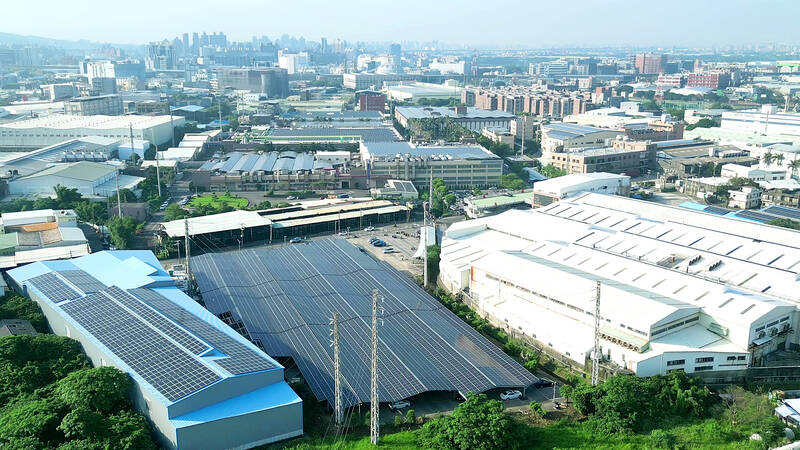Sino-American Silicon Products (SAS, 中美晶) said it is under mounting pressure to sustain its revenue growth during the second half of this year as an industrywide decline in average selling prices (ASP) is spreading to the solar cell and module segments.
The Hsinchu-based manufacturer of solar cells and modules expects falling ASPs to stall revenue growth in the third and fourth quarters, and hit its full-year revenue figure. Revenue last year soared 18.93 percent to an all-time high of NT$81.87 billion (US$2.65 billion), rising for a third straight year.
Revenue last month dipped for the first time in more than two-and-a-half years to NT$6.69 billion, falling 3.26 percent from a year earlier. In the first five months of this year, revenue still grew 7.07 percent year-on-year to NT$34.03 billion.

Photo courtesy of Sino-American Silicon Products Inc
SAS said it saw higher volatility in its solar cell business, as the prices of polysilicon and wafers are sinking rapidly and the price declines appear to be spreading to solar cells and modules, company chairperson Doris Hsu (徐秀蘭) told reporters in Hsinchu on Tuesday.
“As the ASP has fallen significantly compared with last year, revenue would be severely affected, even if we ship the same amount of solar cells as we did last year,” Hsu said.
The price of polysilicon has halved from the same level last year, heaping pressure on solar products such as cells and modules, Hsu said.
SAS is also facing price competition from solar cell imports from developing countries such as Vietnam, Hsu said.
The company said it is an uphill battle to improve its solar cell costs, given its small production scale.
SAS manufactures solar cells in Taiwan and produces solar modules in Germany.
To enhance its technological capability, SAS said it aims to launch high-efficiency N Topcon products early next year, offering samples for customers.
N Topcon technology offers advantages such as a low degradation rate, low temperature coefficient and high conversion efficiency of up to 25 percent, SAS said.
Large M10 N-Type Topcon cells would be SAS’ new iconic product.
Local competitor Motech Industries Inc (茂迪) also said on Monday that it has made major progress in developing N-Type Topcon solar cells and that it expects to start mass production in the first quarter of next year.
In Germany, SAS plans to add early next year one new solar module production line with an annual installed capacity of 400 megawatts to meet robust demand, Hsu said.
SAS would not rule out deploying another 400-megawatt solar module product line next year, if demand continues to trend up, she said.
SAS attributes the healthy demand to German consumers’ willingness to pay a premium for solar products made in Germany.
Solar module manufacturing costs in Germany are much higher than in Taiwan and competition is fierce as the European nation opens to solar imports from around the world, including China, Hsu said.

PROTECTION: The investigation, which takes aim at exporters such as Canada, Germany and Brazil, came days after Trump unveiled tariff hikes on steel and aluminum products US President Donald Trump on Saturday ordered a probe into potential tariffs on lumber imports — a move threatening to stoke trade tensions — while also pushing for a domestic supply boost. Trump signed an executive order instructing US Secretary of Commerce Howard Lutnick to begin an investigation “to determine the effects on the national security of imports of timber, lumber and their derivative products.” The study might result in new tariffs being imposed, which would pile on top of existing levies. The investigation takes aim at exporters like Canada, Germany and Brazil, with White House officials earlier accusing these economies of

Teleperformance SE, the largest call-center operator in the world, is rolling out an artificial intelligence (AI) system that softens English-speaking Indian workers’ accents in real time in a move the company claims would make them more understandable. The technology, called accent translation, coupled with background noise cancelation, is being deployed in call centers in India, where workers provide customer support to some of Teleperformance’s international clients. The company provides outsourced customer support and content moderation to global companies including Apple Inc, ByteDance Ltd’s (字節跳動) TikTok and Samsung Electronics Co Ltd. “When you have an Indian agent on the line, sometimes it’s hard

‘SACRED MOUNTAIN’: The chipmaker can form joint ventures abroad, except in China, but like other firms, it needs government approval for large investments Taiwan Semiconductor Manufacturing Co (TSMC, 台積電) needs government permission for any overseas joint ventures (JVs), but there are no restrictions on making the most advanced chips overseas other than for China, Minister of Economic Affairs J.W. Kuo (郭智輝) said yesterday. US media have said that TSMC, the world’s largest contract chipmaker and a major supplier to companies such as Apple Inc and Nvidia Corp, has been in talks for a stake in Intel Corp. Neither company has confirmed the talks, but US President Donald Trump has accused Taiwan of taking away the US’ semiconductor business and said he wants the industry back

PROBE CONTINUES: Those accused falsely represented that the chips would not be transferred to a person other than the authorized end users, court papers said Singapore charged three men with fraud in a case local media have linked to the movement of Nvidia’s advanced chips from the city-state to Chinese artificial intelligence (AI) firm DeepSeek (深度求索). The US is investigating if DeepSeek, the Chinese company whose AI model’s performance rocked the tech world in January, has been using US chips that are not allowed to be shipped to China, Reuters reported earlier. The Singapore case is part of a broader police investigation of 22 individuals and companies suspected of false representation, amid concerns that organized AI chip smuggling to China has been tracked out of nations such